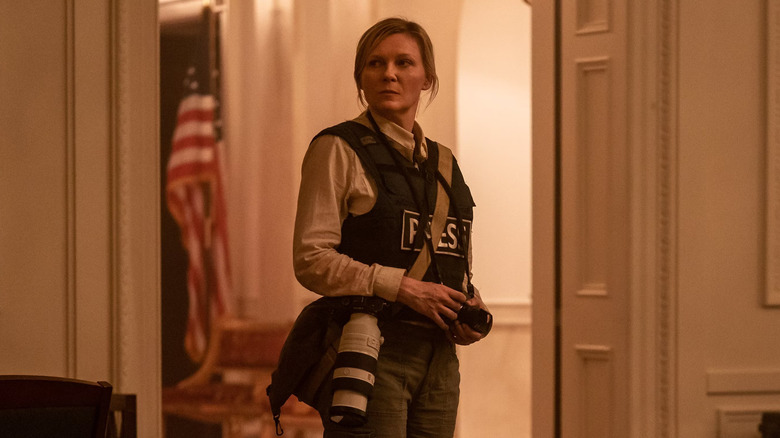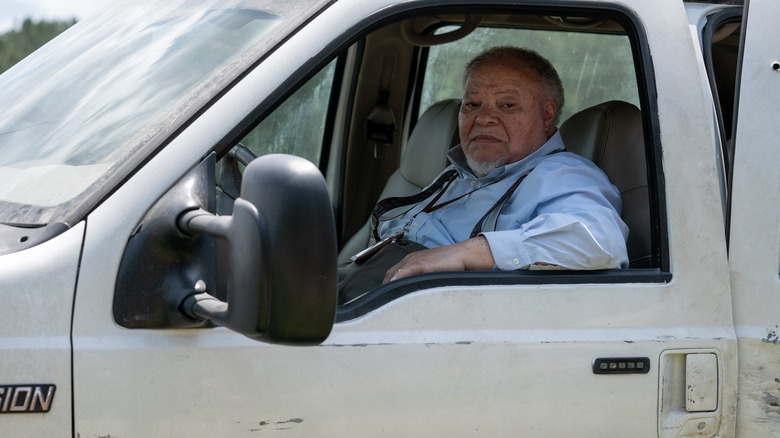Civil War Makes Combat Journalists The Heroes Of The Story For A Personal Reason [SXSW 2024]
Since novelist and screenwriter Alex Garland first made the leap to directing with 2014 sci-fi "Ex Machina," he's rapidly become one of the most interesting filmmakers around. Garland delivered a strong follow-up with 2017's "Annihilation," before dipping into surrealist folk horror with 2022's "Men." His foothold in genre films meant that his new film, "Civil War," was instinctively given the science fiction label, but Garland has clarified that there's really nothing sci-fi about it.
"Civil War" is set in a time that could be anywhere from the present day to a few years from now, in a version of the United States that has fractured into conflict between the "official" government, the "Florida alliance," and an "illegal secessionist government" formed by the united states of Texas and California. At least, that's how the situation is characterized in the trailer by Nick Offerman's POTUS, whom seasoned war journalist Lee (Kirsten Dunst) is racing to interview before the rebel factions descend on Washington, DC. The story is told through the eyes of Lee and other combat journalists that she's traveling with, and this viewpoint was of personal importance to Garland.
"My dad was a political cartoonist for a newspaper, and it was an interesting job, but it meant that I grew up around journalists, and in particular foreign correspondents," the filmmaker explained during a Q&A at SXSW, attended by /Film's senior news editor, Jacob Hall. "My godfather was a war correspondent. So I didn't just grow up with them, I sort of loved them. I heard them talk around the kitchen table and I knew how seriously they took what they did."
'Journalists are getting s**t on'
There have been plenty of great films focused on journalists, from "All the President's Men" to "Spotlight," but they're usually set in the hustle and bustle of the newsroom. In "Civil War," the characters are used to reporting from more violent environments. "Every time I survived a war zone, I thought I was sending a warning home: don't do this," Lee glumly tells fellow reporter Sammy (Stephen McKinley Henderson) early on in the film. "But here we are."
Why did Lee's warning not get through to the people who needed to hear it? Well, one of the things that Garland has noticed in recent years is that...
"Journalists are getting s**t on. They've been distrusted. And I wanted to make journalists the hero because there's a simple point at the heart of [the film], which is that in any kind of free country, but let's say a democracy, journalists are not a luxury, they're a necessity. They are absolutely as important as the judiciary or the executive or the legislature. A free press that is respected and trusted. Journalists have done some of the work to be distrusted themselves, but a lot of other interested parties have been complicit in making them untrusted. And I think it's unhealthy. And I think it's wrong."
On set, the actors found themselves reacting organically to the fictional civil war. Garland doesn't use shot lists or storyboards for films, but instead set up "football plays" of combat situations and then allowed the actors to respond in real time, rather than simply trying to hit their mark. "[The actors] could say, 'I'm going to go here and take this shot,' and then the camera crew would track what they were doing. So it was a little bit of art imitating life; you set something up for real, in a way, and then you react to it."
"Civil War" arrives in theaters on April 12, 2024.

